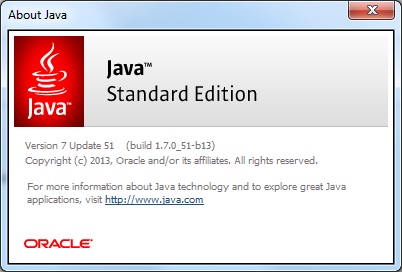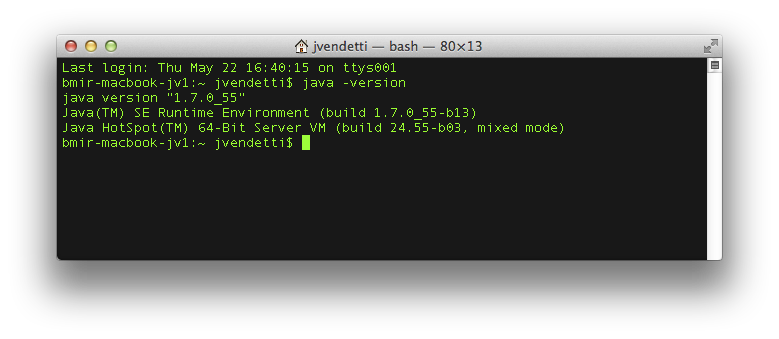Difference between revisions of "Install Protege5 PlatformIndep"
| Line 9: | Line 9: | ||
The platform-independent archive contains the Protege software, including the run scripts to launch Protege on any platform. '''It does not include the Java Runtime Environment (JRE), so you must have a working Java installation on your machine''' prior to using this archive. Also, the platform-independent archive will work with older 32-bit machines. | The platform-independent archive contains the Protege software, including the run scripts to launch Protege on any platform. '''It does not include the Java Runtime Environment (JRE), so you must have a working Java installation on your machine''' prior to using this archive. Also, the platform-independent archive will work with older 32-bit machines. | ||
| − | The required Java version is | + | The required Java version is 8 or newer. |
| − | == If you have Java | + | == If you have Java 8 or newer on your system == |
Then, it's very easy: | Then, it's very easy: | ||
| Line 29: | Line 29: | ||
== Windows == | == Windows == | ||
| − | === Check for Java | + | === Check for Java 8 (optional) === |
| − | This step is optional. Perform this step if you aren't sure if Java | + | This step is optional. Perform this step if you aren't sure if Java 8 or later is installed on your computer. |
To follow are two possible ways to check your Java version: | To follow are two possible ways to check your Java version: | ||
| Line 49: | Line 49: | ||
* Select "cmd.exe" from the results list to launch the Command Prompt application. | * Select "cmd.exe" from the results list to launch the Command Prompt application. | ||
* Type "java -version" at the prompt to view your Java version information: | * Type "java -version" at the prompt to view your Java version information: | ||
| − | |||
| − | |||
| − | |||
| − | |||
| − | |||
| − | |||
| − | |||
| − | |||
=== Launching Protege === | === Launching Protege === | ||
| Line 67: | Line 59: | ||
'java' is not recognized as an internal or external command, operable program or batch file. | 'java' is not recognized as an internal or external command, operable program or batch file. | ||
| − | ''A'': Windows cannot find Java on your system. This can happen either if: (1) you do not have Java installed on your computer, or (2) you have Java installed, but it is not found on the <code>PATH</code> environment variable of your system | + | ''A'': Windows cannot find Java on your system. This can happen either if: (1) you do not have Java installed on your computer, or (2) you have Java installed, but it is not found on the <code>PATH</code> environment variable of your system. |
== Mac OSX == | == Mac OSX == | ||
| − | === Check for Java | + | === Check for Java 8 (optional) === |
| − | This step is optional. Perform this step if you aren't sure if Java | + | This step is optional. Perform this step if you aren't sure if Java 8 or later is installed on your computer, and used by the Terminal application. |
* Open Finder. | * Open Finder. | ||
| Line 89: | Line 81: | ||
== Linux == | == Linux == | ||
| − | === Check for Java | + | === Check for Java 8 (optional) === |
| − | This step is optional. Perform this step, if you are not sure if you have Java | + | This step is optional. Perform this step, if you are not sure if you have Java 8 or later installed on your computer. |
To check that you have Java installed, open a terminal window, and type: <code>java -version</code>. You should see something like this: | To check that you have Java installed, open a terminal window, and type: <code>java -version</code>. You should see something like this: | ||
| Line 96: | Line 88: | ||
<pre> | <pre> | ||
myuser@mycomputer:/$ java -version | myuser@mycomputer:/$ java -version | ||
| − | java version "1. | + | java version "1.8.0_91" |
| − | + | Java(TM) SE Runtime Environment (build 1.8.0_91-b14) | |
| − | + | Java HotSpot(TM) 64-Bit Server VM (build 25.91-b14, mixed mode) | |
</pre> | </pre> | ||
| − | (The version should be 1. | + | (The version should be 1.8 or later) |
| − | |||
| − | |||
| − | |||
| − | |||
=== Launching Protege === | === Launching Protege === | ||
| Line 113: | Line 101: | ||
| − | + | '''[[Install_Protege5#Troubleshooting|See more troubleshooting help on the main Protege 5 installation page]]''' | |
| − | + | == If you do not have Java installed on your computer == | |
| − | + | In case the check for Java 8 from did not work, please install go to the [http://protege.stanford.edu/products.php#desktop-protege Protege website], and download a version that comes with a bundled JRE. | |
| − | |||
| − | |||
| − | |||
Revision as of 15:46, May 24, 2016
 Protege 5 Installation instructions (Platform-Independent)
Protege 5 Installation instructions (Platform-Independent)
Contents
Go to the main Protege 5 installation page
The platform-independent archive contains the Protege software, including the run scripts to launch Protege on any platform. It does not include the Java Runtime Environment (JRE), so you must have a working Java installation on your machine prior to using this archive. Also, the platform-independent archive will work with older 32-bit machines.
The required Java version is 8 or newer.
If you have Java 8 or newer on your system
Then, it's very easy:
- Download the platform-independent archive from the main Protege website. The link is under the platform-specific download button, and it is called: Download platform independent version.
- Run the appropriate run script for your platform (e.g., run.bat on Windows, run.sh on Linux and run.command on Mac OSX).
Note: You may need to adjust the java path in the run script.
If this does not work, read more in the section below corresponding to your operating system.
Also, read more on the installation instructions for your platform from here.
Windows
Check for Java 8 (optional)
This step is optional. Perform this step if you aren't sure if Java 8 or later is installed on your computer.
To follow are two possible ways to check your Java version:
From the Start menu
- Click the Start menu.
- Type "Java" in the search field.
- Select "About Java" from the results list to display a dialog with your Java version information:
From the Command Prompt
- Click the Start menu.
- Type "cmd" in the search box.
- Select "cmd.exe" from the results list to launch the Command Prompt application.
- Type "java -version" at the prompt to view your Java version information:
Launching Protege
Read the instructions here.
Troubleshooting
Q: When I run run.bat in Windows, I get the error message:
'java' is not recognized as an internal or external command, operable program or batch file.
A: Windows cannot find Java on your system. This can happen either if: (1) you do not have Java installed on your computer, or (2) you have Java installed, but it is not found on the PATH environment variable of your system.
Mac OSX
Check for Java 8 (optional)
This step is optional. Perform this step if you aren't sure if Java 8 or later is installed on your computer, and used by the Terminal application.
- Open Finder.
- Go to Applications -> Utilities.
- Double-click the Terminal application.
- At the prompt, type "java -version" to see your Java version number:
Launching Protege
Read the instructions here.
Linux
Check for Java 8 (optional)
This step is optional. Perform this step, if you are not sure if you have Java 8 or later installed on your computer.
To check that you have Java installed, open a terminal window, and type: java -version. You should see something like this:
myuser@mycomputer:/$ java -version java version "1.8.0_91" Java(TM) SE Runtime Environment (build 1.8.0_91-b14) Java HotSpot(TM) 64-Bit Server VM (build 25.91-b14, mixed mode)
(The version should be 1.8 or later)
Launching Protege
Read the instructions here.
See more troubleshooting help on the main Protege 5 installation page
If you do not have Java installed on your computer
In case the check for Java 8 from did not work, please install go to the Protege website, and download a version that comes with a bundled JRE.

